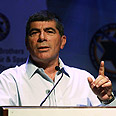
Ashkenazi: Military must be involved in Iran decision
Former IDF chief of staff says that the military must be a dominant partner in Iran strike decision; notes it could have major impact on outcome
Speaking at a conference focusing on the Operation Cast Lead decision making processes, Ashkenazi noted that "The General Staff and its chief cannot but be involved in the deliberations with the political echelons over the possibility of war.
Related stories:
- Winograd: Iran strike endangers Israel's future
- PM: Political echelon will decide if we strike Iran
- IDF chief on Iran: All options on the table
"That where they need to be and if they aren't, they need to create the option, that way there are fewer mistakes."
Ashkenazi praised the political echelons for their actions in the 22 days of fighting during Operation Cast Lead and most of all, praised the free hand given by then Defense Minister Ehud Barak to the military.
As for political intervention in how the military conducts its battles in the midst of a war, Ashkenazi said that while the "phenomenon is familiar, it did not happen at the time (Operation Cast Lead).
"The defense minister did not sit in and determine our targets. We were given freedom to maneuver even when things got very complicated."
Ashkenazi added that "The General Staff needs to understand the issues to initiate the process of war together with the political echelons. The military must be a partner and recommender; it has a major impact on the outcome of the war. It is our duty.
We must ensure that our actions are obtainable, not in the sense of a pilot in the cockpit or soldier in a tank, rather in the wider sense. Putting a military force into action is the tool, not the objective.
"We need to coordinate expectations between the military and political echelons. The discourse is critical in shaping the outcome. Sometimes that leads to disagreements."
Addressing his successor to the role of chief of staff, Ashkenazi said: "I would strongly recommend that Gantz do this thoroughly. Try Benny, to know how you want to get out og this. There is a strong link between major achievements and the price you have to pay, and not in the sense of losing a soldier.
"During Operation Cast Lead the Security Cabinet enabled us sound out our position. The goal of the war wasn't to bring back Gilad Shalit and it did come up in discussions. You need to have a mechanism for ending the war.
"The then prime minister, Livni (foreign minister) and defense minister disagreed on the matter – which delayed our ground assault."
- Receive Ynetnews updates directly to your desktop










